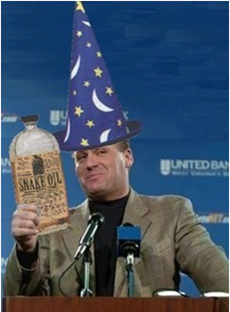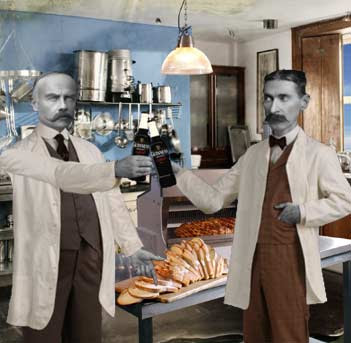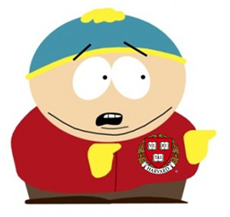Old Blue: the New Crimson
[ed: bumped despite deployment of worst photo of yrs truly ever.]
“…if you gaze into the abyss, the abyss gazes also into you.” –Nietzsche
Son of a bitch. It’s happening. Quit lookin’ at me, abyss.
In 1960 JFK referred to himself as “…a graduate of the Michigan of the East, Harvard University.” I’ve always thought of that as a high compliment towards Michigan. Now, however, I also recognize the glint of the hex that was unwittingly cast upon us on that day. Upon uttering those words, the 35th P.O.T.U.S not only saluted the University of Michigan’s academic excellence, but he also set our crown jewel onto a collision course with gridiron suckitude. Allow me to explain.
I recently came across an article from 1949 in The Harvard Crimson. The article is over 3000 words long, but the first shiver slithered up my spine before I had even reached the byline: “Alumni, Doing Nothing, Scream for Blood After Worst Season Ever.” By the time I had finished reading the article—A Clockwork Orange style—my spine was a full blown electric eel in the throes of a nervous breakdown.
It’s hard to resist full verse recitation of the whole article but, here some highlights:
-
There are references to Harvard’s recruiting footprint and the need for MOAR
ESS-EEE-CEEHAWA-EEE-EEE SPEED! - The authors bitch about being charged “$4.20 or even $3.60 to see Harvard play an obviously poor football opponent.” Oh, the humanity! It’s weird though because throughout the article they vacillate their complaints between playing cannon fodder and actually being cannon fodder.
- There are reports of familiar alumni complaints a la, “Hurr, hurr…get off my lawn with that new fangled, Crisler-style, single-wing offense and two-platoon system; you…you Michigander, you. Gimme back my Power T.”
And two choice excerpts from the article
“[Current coach] ought to adapt his system to fit his players, the way ‘good old [retired coach] used to do.’ "
But the crucial concern right now is that no attempt to change the situation involve the firing of [Current coach], who may not be the genius he was hailed as last year but who is certainly doing his best--and a definitely competent best--with what material he has.
Go ahead and do whatever it takes to rid yourself of those heebie-jeebies; I’ll wait. Seriously, it’s like Brian himself had been warped to 1949 via the way back machine to write that article. It’s impossibly eerie; much like this ancient statue of Michael Jackson an anonymous Egyptian woman and this authentic picture of Brian some bespectacled dude with long hair in a block M tee shirt.
[ed: more disturbing parallels between Harvard circa 1950 and present-day M after the jump.]
As interesting as all of that is, there are bits in regards to recruiting that I find the most fascinating. There are direct shots taken regarding players being “…bought up and sent to the big Southern schools.” Back then being bought up consisted of being given an athletic scholarship or attending a training table in addition to things we modern heathens would recognize as inappropriate. How ironic that the ESS EEE CEE basically invented the athletic scholarship without ever encouraging the scholarship of its athletes.
Twenty years before the Crimson article, the Carnegie Foundation wrapped up a huge 3.5 year investigation costing approximately one hundred thousand dollars a lot of money that yielded Bulletin no. 23 a 347 page report called American Collegiate Athletics which, amongst a lot of other things, found that over 78% of athletic programs were engaged in unsavory activities of some kind. Michigan was very likely to have been one of them as evidenced by the Kipke ordeal. Hey, you know that Gerald Ford guy? He was “on the take”, too; he was guaranteed a job by Kipke which was a frowned upon recruiting tactic as was the very act of recruiting. But everyone was doing it so, what’s the big deal? Amiright? Anyway, the Carnegie Report was front page news when it broke, but the stock market collapse that turned into the Great Depression was headline news and the report faded into obscurity. And good thing too, if the economy hadn’t sucked, college football might have. Maybe Gordon Gecko was right—greed is good.
The Carnegie Report captures a prevalent definition and view of recruiting of the time: “procurement of [athletes] with the purpose of increasing an institution's prestige in athletics. Invariably … recruiting on this basis acquires a sinister aspect…” The article in the Crimson falls over itself in agreement with this premise. Some of the comments are similar to those that we hear associated with modern recruiting at Michigan:
… football players should never be allowed to come here unless they can pass entrance exams in equal competition with their less agile contemporaries.
and
After all, Harvard should not need athletic scholarships to entice men to Cambridge. The University not only offers an A.B. degree of unmatched prestige value, but also has as good a range of courses as any other college, better taught than in almost any other college.
How many times have we heard those exact same sentiments in regard to Michigan?
What do the Crimson authors propose as a solution to the ills that ailed the collegiate landscape? Boosters, rent control, and guaranteed employment. Welcome to polar opposite land.
A few years later, a committee of the American Council of Education, headed by the president of Michigan State University, proposed reforms to collegiate athletics in 1952 that would have forbidden athletic subsidy, offseason practice, and post-season competition. No scholarships, no spring football, no bowl games. Great ideas, Sparty. Even back then, Sparty wasn’t doing its own homework because the proposals were largely those of the Ivy Group Agreement of 1945 which was written specifically in regards to football. In 1956 the Ivy League was officially formed extending the agreement to all varsity sports. To this day the Ivy League forbids offseason practice and participation in post season football games. However, they participate in March Madness so, they’re hypocrites. But we already knew that.
Around that time Michigan also took measures to clean up its act. Makes you wonder about the root cause of the struggles of the 50’s and 60’s, doesn’t it? Illinois and Iowa both got popped in that timeframe for slush-fund or recruiting type violations.
Now, Harvard and its Ivy League brethren chose their fate. They collectively surveyed the landscape of collegiate athletics, got nauseous, and took concrete action to leave Gomorrah. They didn’t do it half-assed by saying “we’re going to win the Hahvahd way” they said “screw you guys, I’m going home.” Frankly, I respect the fact that they had the gumption to do it. So did the University of Chicago.
Three generations later, many are saying the exact same things in regards to how recruits “should be honored to receive an offer from Meechigan” and how “Meechigan doesn’t need to stoop to get recruits like Demar Dorsey.” Meanwhile, people with Michigan lineages spanning generations seemingly have no clue of the Program’s history of setting the standard for what should and shouldn’t be permissible in the spirit of fair competition.
Now we’re being scolded about how ashamed we should all be that Michigan’s un-pristine record of integrity has been tarnished due to having exceeded the 20 hour weekly limit on 1 occasion by 20 minutes. [Most of the 65 hour overage occurred during off season conditioning or daily limits. Michigan only ran 20-minutes worth of extra drills in practice. If you over-prepare for one game by 20 minutes, you reeeally suck at cheating.] This is akin to Johnny Smartypants being suicidal about getting a 99.9% on an exam instead of his customary 100%. It’s still an A+ John; go to college.
 I’ll close with a proposal: let’s be the anti-Harvard. Until the 70’s, athletic scholarships were granted on a four-year basis. The practice was discontinued because of athletic department budgetary grievances. In an era where athletic scholarships are not four-year commitments, lets make it happen.
I’ll close with a proposal: let’s be the anti-Harvard. Until the 70’s, athletic scholarships were granted on a four-year basis. The practice was discontinued because of athletic department budgetary grievances. In an era where athletic scholarships are not four-year commitments, lets make it happen.
“Hey, desired recruit, we’re so sure that you will be a productive member of the Michigan family that we are willing to commit to you for at least four years if you’re willing to do the same. All you have to do is stay in good academic standing and adhere to our code of conduct. If you ever want to transfer, you’re free to do so. The NCAA doesn’t obligate us to commit to you for longer than one academic year, but this is how we operate.
Did I mention our helmet’s got wings?”
Then again, I’m sure the NCAA would object because such a practice wouldn’t be in the student athlete’s best interest.
wasn't right. Greed isn't good.
Other than that, plus one for an interesting and timely post.
College football has long had a cutthroat edge to it. The struggles of the 50's and 60's may well be tied to it.
I'm not ashamed. I don't believe what we "did" was so bad, I think we were screwed.
...four year scholarships, even if you get injured. We do it anyway. Make it official and make it a selling point.

For some reason those things that were being said sound familiar to me.
I believe guaranteeing more than one year at a time is a violation (at least I think Brian said this a couple weeks ago or so).
...is correct.
15.02.5 Full Grant-in-Aid. A full grant-in-aid is financial aid that consists of tuition and fees, room and board, and required course-related books.
15.02.7 Period of Award. The period of award begins when the student-athlete receives any benefits as a part of the student’s grant-in-aid on the first day of classes for a particular academic term, or the first day of practice, whichever is earlier, until the conclusion of the period set forth in the financial aid agreement. An athletics grant-in-aid shall not be awarded in excess of one academic year.
Source: 2009-10 NCAA Div I Manual
All of this press about how Michigan (despite it losing record the past two seasons) created a competitive edge for themselves by using extra practice while Alabama (an actual championship team) blatantly creates an advantage by over-signing players...makes me want to vomit.
Snyder says One Day At A Time

Hard to believe that guy will be 81 later this year (http://www.imdb.com/name/nm0364224/)...
Great post, great writing. Well done MCalibur, I've read a lot of your postings and you seem pretty on top of things.
I've been thinking about the cultural abyss (i.e. "We are Notre Dame" video) that ND is currently plunging into. They've put all their chips on Brian Kelly being a success, and a few more losing seasons might do them in. I would be interested to hear your take on the 'Storied History' of Notre Dame and how it's led them up to a Nietzsche-like abyss.
Here's my take. I analyzed Notre Dame - Army 1946, hailed at the time as 'The Game of the Century'. Both teams are running variations of the 'Notre Dame Box' (2 TEs and 4 backs in the backfield), the game ends in a scoreless tie, and both teams' quarterbacks only complete a quarter of their attempted passes.
I think that Notre Dame has done a superb job of marketing their school and their program over the 20th Century. Playing military academies probably helped them recruit a lot with military families and the like. But in the hyper-competitive environment of today, simply relying on top-10 recruiting classes and 'decided schematic advantage' simply isn't winning enough games for them anymore. And they can't seem to pull themselves out of the death spiral, unless Kelly is one heck of a miracle worker, what with that bad offensive line and the dreaded frosh quarterback syndrome.
Thoughts?
My desire to acquire knowledge about ND is only incidental to my desire to acquire knowledge about Michigan. So, I can't really speak to Notre Dame's history all that much. I usually take the "to hell with Notre Dame" approach.
I will say that there are some really interesting articles that touch on the value of television exposure. TV was a huge game changer in the 40's and 50's. Hell, there are people still alive that could speak to it better than I could. Back in the day, there weren't 50 games on TV, there were one or two and ND was frequently one of those. The decision to stay independent is rooted in that (explicitly so) but, I think, that particular edge has been duly neutralized in the last 10 years or so. Ten years from now--heck, 10 months from now--independence could be a net disadvantage.
I think Brian Kelly is a good coach and the roster he inherited is not a disaster. If any one can make Notre Dame not look ludicrous, its him. But, that's not the same thing as winning National Championships. I think he can do it, let's see if it actually happens though. I think having a good defense is more difficult to achieve than having a good offense; I don't know if Kelly has ever really had a notable defense. Cinci's defense last year was a piece of junk.
Cinci's defense last year was a piece of junk.
And many of the offenses they encountered were also a piece of junk, so on balance, advantage Cinci. This year, Kelly is about to encounter some really potent offenses and defenses. USC, even with a new coach, is going to field some real studs. Michigan's DL could make swiss cheese of the rebuilt ND OL, to go with an offense that should - on paper - be able to score some points. Don't count out Pitt's D or MSU's offense. And Tulsa may surprise ND in its ability to score.
Looking at ND's schedule, there are the usual, presumed "cupcakes", to got with some very, very difficult games. Brian Kelly is either going to get a "Welcome to Big Time College Football" beating, or he's going to unleash all that talent in a way that Weis never could. There is really no middle ground.
Or is it an allegory. An extended simile? A mere comparison?
Anyway, well-done all the way around.
as usual.
Bravo. Timely, intriguing diary.
we’re so sure that you will be a productive member of the Michigan family that we are willing to commit to you for at least four years if you’re willing to do the same. All you have to do is stay in good academic standing and adhere to our code of conduct.
What's the downside? Is the recruit financially liable for the scholarship? It's a good idea, but without any penalty, it doesn't carry weight. And no school would want the publicity of sending a poor, underpriveledged kid a bill for 3 years of school after choosing to transfer, especially with the likes of the Freep hanging around.
The scholarship is the player's compensation for participating on the team. It's a mutually beneficial relationship for as long as it exists. That's been a long standing argument against actually paying them. In the transfer scenario, nothing would need to change from what happens today.
We're sorry to see you go. Good luck. The End.
That's ignorant. Let's climb a tree!
Two completely unrelated thoughts:
1. This is why MGoBlog is so awesome. Not that all user-generated content is this good, of course, but some of it is. Compare to the paranoid ravings of that one-eyed Italian skullfucking aspirant over at BHGP. Nice job, as per usual, MCalibur.
2. Re your point:
How ironic that the ESS EEE CEE basically invented the athletic scholarship without ever encouraging the scholarship of its athletes.
With all due respect, that ain't irony.
recruiting. Echo MGoShoe...within the current regime - Mealer...without - Bass (just to name a few)...those who don the winged helmet are guaranteed a seat in the classroom to do with as they may. This is a point that needs to be made to every recruit and parents there of.
In Mealer's case it goes deeper.
Excellent read!
Epic diary. Loved it. The comparison is eery.
Have we neutralized the curse by giving them our basketball coach (and then letting him beat us)?




Comments